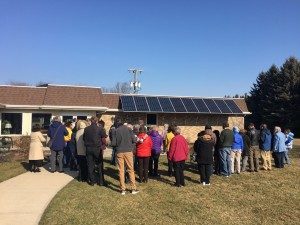Chapter 12: Case Study: Consumerism
12.3: A Protestant Perspective: Life in All its Fullness: Christian Faith and the Dilemmas of Consumption, by Dr. Sondra Wheeler

Sondra Wheeler’s essay on Christian faith and consumption provides many excellent points, and is worth reading in its entirety (text will be linked here). She notes that environmental problems may seem new, but the questions we wrestle with related to consumption are old – as old as our religions and connected to basic theological questions about the nature of God, humans, and the world in which we live. So rather than construct a “new” theology of consumption, she suggests that our task is more like seeing a new vision of our ancient traditions, which may help us see ourselves differently, and help shape our lives in new ways. She focuses on several theological perspectives:
The World as Creation – God’s creative work implies a “fundamental goodness and holiness of material reality” (23). All things have value as God’s creation – not just value for human use, so our use of the world’s resources must give moral weight to the natural world. God intends that the all life should flourish and be sustained, so degradation of Earth’s resources flouts God’s will and threatens our well-being “as we overwhelm the planet’s resources for self-healing” (23).
The Earth is the Lord’s – God retains final claim on the cosmos, and the role of humans is precisely as caretakers – stewards of God’s world. As such, we are to care for the world for the good of the whole household (all life), and as God’s stewards we are accountable to God for doing so. Current income and well-being inequalities show us that not all are flourishing, so our rates of consumption in the developed world are an issue of environmental and economic justice. Given such inequity, we need to “focus our efforts on creating a greater balance among persons, and between persons and other creatures” (24).
To Be the People of God – If we are God’s people, we honor God’s intention that all can flourish, and so we should judge our conduct on the standard of the well-being of the whole community. Community and cultural life are rich parts of human well-being – the ideal is not a lone hermit in the wilderness – but cultural life can become chaotic, hurried, stressful, and focused on material accumulation that doesn’t actually lead to happiness. Instead of chasing after things that do not make us happy, Wheeler says we need to remember that our flourishing comes from relationships, from community life and faith, from focusing on things we truly need.
God of the Poor – Wheeler reminds us that biblical traditions establish a preference for the poor, where the poor are to be cared for as bearers of Christ. Wages for labor should be just. When patterns and structures of consumption and commodity pricing favor the well-fed at the expense of the poor, injustice is the result. To fail to attend to the plight of the poor, “the prophets insist, is to invite the wrath of God.”
Idolatry and Bondage – The Perils of Overconsumption – Idolatry is putting something else in place of God, and in a consumerist society, the “irony is that while purchasing power may successfully displace God as the source and guarantor of our well-being, it offers, in fact, neither abiding happiness nor any secure promise of safety” (26). Putting our faith in material things also leaves us craving and coveting the things that others have. Wheeler says that “the genius of our advertising-based economy and the culture that supports it is the fact that consumption creates not satisfaction, but the desire for more consumption” (27), and we are always left wanting more, seeking “some new object to provide the happiness that eludes us. And all the while we ignore what our religious traditions teach us is the real nature of human beings: that we are embodied spirits, created to receive their real good and their lasting happiness in the joys of communion with God and with one another” (27).
Free to Live and Work Together – Wheeler says the most significant contribution of Christian faith to our struggle with consumption “is its very different account of what is worth striving for….Of those relatively few material things we genuinely need: food, drink, shelter, and clothing, we are told, ‘seek first God’s kingdom and God’s justice, and all these things will be given to you as well’ (Mt 6:33). The good news that we call the gospel is the declaration that in Jesus Christ, God has come to rescue and reclaim us, and that our genuine well-being and deepest satisfaction are found in clinging to that truth above every other thing.” (27) We are free to work with others and with God towards the reconciliation and redemption of all things. And “freedom from the anxious pursuit of more things frees us for the work and the celebration of creating a new culture; teaching ourselves and our children new stories, songs, pictures of ‘the good life’; speaking out and living out new values which see all creatures truthfully, as ‘joint heirs of the grace of life’ (I Pet. 3:7)” (28).
